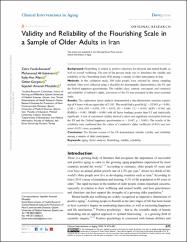Validity and reliability of the flourishing scale in a sample of older adults in Iran

Göster/
Erişim
info:eu-repo/semantics/openAccessTarih
2020Yazar
Fassih-Ramandi, ZahraSoleimani, Mohammad Ali
Allen, Kelly-Ann
Görgülü, Özkan
Motalebi, Seyedeh Ameneh
Üst veri
Tüm öğe kaydını gösterKünye
Fassih-Ramandi, Z., Soleimani, M. A., Allen, K. A., Gorgulu, O., & Motalebi, S. A. (2020). Validity and reliability of the flourishing scale in a sample of older adults in Iran. Clinical Interventions in Aging, 15, 673.Özet
Background: Flourishing is related to positive outcomes for physical and mental health, as well as overall wellbeing. The aim of the present study was to determine the validity and reliability of the Flourishing Scale (FS) among a sample of older participants in Iran. Methods: In this validation study, 300 older people were selected by cluster sampling method. Data were collected using a checklist for demographic characteristics, the FS, and the Oxford happiness questionnaire. The validity (face, content, convergent, and construct) and reliability (Cronbach’s alpha, test-retest) of the FS was evaluated in this cross-sectional study. Results: The exploratory factor analysis demonstrated a one-dimensional structure consist-ing of 8 items with an eigenvalue of 3.583. The model had a good fit [χ2 = 52.983, p < 0.001, χ2/df = 2.944, GFI = 0.958, CFI = 0.915, IFI = 0.949, TLI = 0.919, AGFI = 0.948, and RMSEA = 0.081, SRMR = 0.086] with all factor loadings greater than 0.5 and statistically significant. A test of concurrent validity showed a direct and significant association between the FS and the Oxford happiness questionnaire (r = 0.647, p < 0.001). The results of the reliability tests confirmed that the values of Cronbach’s alpha coefficient (0.819) and test-retest (0.821) were acceptable. Conclusion: The Persian version of the FS demonstrated suitable validity and reliability among a sample of older participants. © 2020 Fassih-Ramandi et al.

















